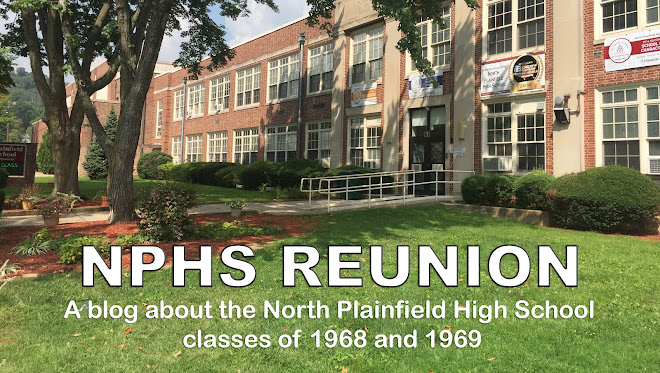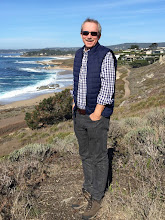 |
| Sue with her "furry child" Macree in 2014 near Gettysburg, PA. |
I taught high school history and English in Fairfax County (Virginia) Public Schools, retiring in 2005. Teaching was an immensely rewarding and demanding career that in many ways allowed me to relive and truly appreciate how exceptionally fortunate I was to have been a part of NPHS.
Where have you lived since graduating?
I attended and graduated Mary Baldwin College in Staunton, Virginia. After college graduation in 1971, I lived at home in North Plainfield until 1973, when I took a job in Washington, DC, and lived in several different Maryland cities (Silver Spring, Bethesda, Chevy Chase) and Northern Virginia suburbs (Alexandria, Falls Church, McLean, Arlington). When my husband retired a few years ago, we moved to Pennsylvania and now live in Center Valley (southeast of Allentown).
Who were your friends back in high school? Are you still in touch with them now?
I had a few close friends through our high school years — Jeff Sperling (since 6th grade), Laraine Cox and Karen McCleary (since 7th grade), Rosanne DeTommaso, Nancy Reis. I am grateful to have either stayed in touch ever since or reconnected from time to time over the years — we just pick up where we left off last time we spoke or were together. Jeff and I met for lunch this month (July 2018)!
Do you have any regrets about your experiences during your high school years?
Very few, but, I learned a lot from those errors in judgment. My high school years were truly wonderful!
Now, 50 years later, has your perspective on your high school years changed at all? If so, how?
In high school I knew I had excellent teachers and that I was receiving an excellent preparation. Now, 50 years later, and, having been a teacher myself, I truly appreciate not only my exceptional teachers, but the talented and good people who were my classmates. After leaving our 30th reunion, I felt a renewed sense of belonging and pride in being a part of an extraordinary group of intelligent, accomplished, caring and down-to-earth people. To whom much is given much is expected — I like to think that the Classes of 1968 and 1969 have lived up to that!
What is your fondest memory of your years at NPHS?
How about a few of my fondest?
Riding on the bus to away basketball games: We cheerleaders rode in the front and the players in the back and there was a lot of school spirit and lots of encouragement on the way over and on the return either celebration or consolation and more encouragement. The sense that we were all a part of something wonderful was palpable and inspiring.
Great Book discussions: They were high anxiety command performances but undoubtedly the highlight of my academic experiences — hard work can be fun!
Singing the Alma Mater at graduation: Fondest mem’ries round thee linger, cheer our hearts anew. The moment I turned to exit my row for the recessional and faced Rosanne DeTommaso, we both burst into tears of joy and sadness because we were graduating.
What was the craziest or stupidest thing you did in high school?
A group of us freshman girls decided it would be fun to sneak up behind upper class boys and rip the loops off the backs of their shirts while yelling “fruit loops”. We would count to see who had the most, and, it was all meant to be a fun way to make our presence known. We got their attention, and, most of them laughed it off as us just being silly, but I recall one senior boy making it clear he was not amused, and, he scared me enough to stop right then and there. Years later I would chuckle and cringe about our audacity and complete oblivion to invading all those boys’ personal spaces.
What was your proudest accomplishment in high school?
Being chosen to give a speech at graduation. I still have the typed copy I delivered that evening and read it over from time to time. I must admit I am still proud of it and marvel over the fact that I just sat down and wrote it, pretty much straight from the heart and find the ideas still ring true. I give credit to the culture of NPHS and my teachers, especially Miss O’Brien and her weekly essays and Great Books required reading, for instilling in me the values and guiding principles articulated in that speech that have served me well ever since. I think the four of us – Karen McCleary, Sue Turnbull, Harry Lewis and myself – felt especially privileged to be able to address our classmates in our own words. In the days leading up to the ceremony, we met with Mrs. Bevins over in the band room at Harrison School to practice our speeches and get feedback. At that time, and, even today thinking back, it felt like a very special moment for all of us. Essentially, my speech was about recognizing the incredible gifts our parents’ and earlier generations had bestowed upon us, the importance of upholding certain values, using our talents to make the world a better place in the face of the turbulent times being thrust upon us, and, our responsibility to future generations to ensure their inheritance of our share of abundance. With apologies for a lack of humility — those ideas are pretty impressive coming out of a 17-year-old, and, I give myself some credit for being intelligent enough to craft a compelling thesis. More credit must go to my parents and grandparents, but, much of the credit goes to my NPHS education and the extraordinarily talented teachers who imparted their wisdom, cared deeply about us as human beings, and equipped us with lifelong learning skills.
Who was your favorite teacher?
I loved school and most of my teachers, so, I have more than one favorite — please indulge me: Katie Gordon, English 11; Joe Pecoraro, Algebra II; Terry Haines Martin, Bio and Advanced Bio; Judith Ullman, Spanish I and II ; Rose Bellino, Chemistry; Nancy Schuman, Judy Grady and Grace Roff Hodge, P.E.; last but not least, the legendary Marie O’Brien!
What was your worst class?
That would have to be U.S. History II — with apologies to Ed Stec — a great guy — but I could not stand memorizing names and dates! I left NPHS swearing I would never take another history class and wound up majoring in history when I was introduced to primary sources and inquiry as method!
What is your most powerful or haunting memory during your years at NPHS?
Irene Hutnick’s death. She was our cheerleading sponsor and, upon reflection at the time, in the weeks leading up to her death, she seemed unhappy. That she took her own life was inconceivably tragic and difficult for us to understand the pain she must have endured.
Living through the 1967 riots in Plainfield was the first time I can remember being fearful for my physical safety and struggling to understand my parents’ inability to reassure me. That’s a powerfully haunting memory indeed. Having been raised as what I would describe as “color-blind,” the presence of the National Guard with their armored tanks at the West End Avenue border with Plainfield introduced me to the disturbing concept of “us against them.”
How did growing up as a child of the 60s – and all the social baggage and impact that it may have entailed – impact you at the time and in your young adult years?
As a young woman coming of age in 1968, I think I was typical in that I went to college expecting to become an educated wife, and, although I always liked the idea of becoming a teacher, I had no expectation that I would ever have a “career” as anything but a wife and mother. Attending a small liberal arts college for women changed that slightly as “Women’s Lib” took off. However, most of my classmates and I thought that liberation was for women who didn’t want to be married and raise families. It must have frustrated our professors trying their best to create college-educated professional women, because most of us were only concerned with whether we were going to Charlottesville or Lexington or somewhere else to date the cutest boy at the best fraternity. Sad, but, true! "The Feminine Mystique" was required reading for all of us freshman year, but, I recall not taking it too seriously. By graduation, the seeds of my own feminism would take hold and remain firmly planted, thanks entirely to being at a women’s college!
As mentioned above, I felt I grew up color-blind and, as has been mentioned by others in this blog, non-discriminatory regarding race and religion. I perceived North Plainfield as a community in which respect for others was a universal value. As a White Protestant female, I knew very little of the sting of discrimination.
My naivete, particularly towards race relations, was shattered when I arrived in Staunton — birthplace of Woodrow Wilson — and was an eyewitness to de facto segregation and its nuanced injustice. When I began teaching in Northern Virginia in the late 70’s, I was shocked to learn that Fairfax County Schools had only been fully integrated on the secondary level in 1965 — only three years before I attended college.
The anti-war movement was a passion for me, and, although Mary Baldwin College was a relatively quiet campus, many of us did what we could locally to support the effort. I dragged a friend to a rally in downtown Staunton in May 1971, and, we wound up with our pictures in a story in the Staunton News Leader — much to my delight and her parents dismay. I wrote my thesis on the history of the contemporary student protest movement and used the archives at Princeton and the University of Virginia for a lot of my source materials. The History department chair wasn’t too impressed with my work, but my thesis mentor was proud and pleased. It was certainly not my finest piece of writing but I met my requirements, passed my oral defense, and said my piece — no pun intended.
The events and social movements of the sixties and seventies created a paradigm shift of unfathomable proportion that continues to evolve, and, my years at NPHS continue to guide me through this turbulent world of ours. I think that’s pretty remarkable!
 |
| Leonard Hall, American University, 1969. Sue waits for Jeff Sperling's refrigerator to defrost. |









